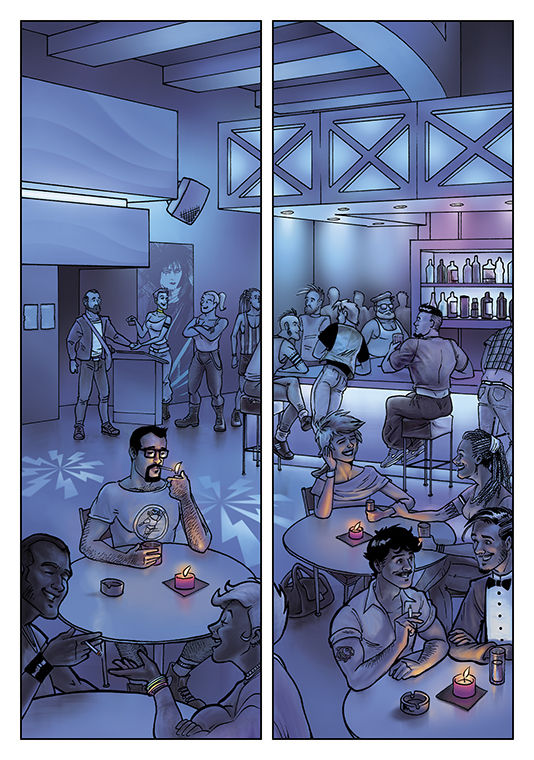Holy homoerotic comics, Batman!
November 9, 2015
Everyone’s sexual awakening has a different origin story, and comic book superheroes are a part of many of them.
Dale Lazarov, a writer for Sticky Graphic Novels, is scheduled to give a presentation Nov. 10 on how comics contributed to his realization of his sexuality titled “Comics Made Me Gay” at Geek Bar Beta, 1941 W. North Ave.
Lazarov said he has been a lifelong reader of comics and loves ‘80s alternative comics. He started writing what he calls “character-based, homoerotic, sex-positive graphic novels” about 10 years ago.
“I’m happy there are gay characters in mainstream comics, but I honestly think it has caused people to ignore their own native culture,” Lazarov said.
Lazarov said he thinks people ignore their culture when they compromise LGBT characters by trying to pander to straight people, and he likes alternative comics because they do not do that.
“My problem is not with mainstream publishers, but with the fans of mainstream publishers,” Lazarov said. “There’s a stance that if it doesn’t [follow] one of the major continuities—either DC or Marvel—it is not real.”
Lazarov said he thinks comics are useful in depicting people’s eroticism, identity and sexuality.
“Sexuality and relationships are all individual,” Lazarov said. “I think comics are a great medium to demonstrate that there’s no one ideal way to be gay, manly or femme. There’s a huge spectrum of manliness, and comics allow that to happen in a way other mediums really don’t.”
Lazarov said he thinks the gay community should not be rigid regarding how they describe and think about each other in terms of features and body type.
“When I was [in my 20s], I didn’t know I was attractive,” Lazarov said. “In fact, I used to think I wasn’t really gay because I never saw anybody like me. In the ‘90s, people started drawing and painting guys who looked like me, and I was like ‘Wow, I’m supposed to be hot, and if this is desirable, yep, I’m a homo.’”
Lazarov said he would like it if the young members of the queer community were nicer to older gay people who had a tougher time than them because he often feels excluded from the scene.
“I would love it if young queers could spend more time acknowledging older people,” Lazarov said. “I went to a Madonna party at Berlin, and people treated me like I shouldn’t be there, and I’m going, ‘B—h, I bought Madonna’s first record before she was cool. I belong here more than you.’”
He said he came up with the idea for the presentation five years ago and first performed it in 2012. He added that he does not want to overwrite the presentation, so he will be improvising some of it and see what catches the audience’s interest.
“I’ll be using examples from old-timey superhero and alternative comics to show how comics are particularly suited to
show the subjective and the objective experience of eroticism,” Lazarov said. “One thing single images can’t do is give you a narrative context for the sexuality.”
David Zoltan is the Fleet Admiral and founder of Geek Bar Beta, where the presentation will be held. He said Lazarov runs the bar’s monthly Gay Comics Salon.
“We trust [Lazarov] to put together an amazing and fun chat that will get people talking about how comics have influenced their life as somebody who is gay and how that helped them, or sometimes how it hurt them,” Zoltan said.
Zoltan said the Geek Bar Beta has
genderqueer-and transgender-friendly bathrooms and works to be as inclusive of the LGBT community with its events as possible.
“This is an opportunity for people to talk about their experiences, what the comic book community can do to make things better for people in the future and to keep a positive outlook on helping each other in the geek community at large,” Zoltan said.
Zoltan said the bar is the first he knows of to have an anti-harassment policy.
“LGBT visibility is important in everything, not just entertainment,” said Victoria Shannon, an adjunct faculty member in the Humanities, History & Social Sciences Department. “It should be included in history, psychology, economics classes even. All that needs to be more inclusive because LGBT people need validation and affirmation.”
Shannon said she believes LGBT students can use different forms of art to tell their stories and wishes more people would share their coming out stories.
“You should not take for granted that the world welcomes you,” Lazarov said. “You should remain vigilant because at any moment, things could change.”
“Comics Made Me Gay” will take place at Geek Bar Beta Nov. 10 at 7:30 p.m. with free admission. For more information, visit GeekBarChicago.com. For more on Dale Lazarov, visit DaleLazarov.com.








